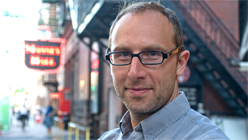David Bezmozgis, one of The New Yorker‘s 20 under 40, recently visited the KQED studios to talk to us about his new novel, The Free World, emigrating from the Soviet Union, his writing process, and the last album he fell in love with.
Your first novel, The Free World, tells the story of a family of Latvian Jews who must stay in Rome for six months to secure their visas to North America. I understand this narrative is quite close to your real life experience. What made you want to preserve that point in time through fiction?
David Bezmozgis: It’s close in the sense that my family emigrated from the Soviet Union in 1979 and spent four months in Rome before ultimately settling in Canada. I was a child then. Over the years, I’d heard a lot about the Italian intermezzo. I was always fascinated by it because it seemed to offer so much dramatic potential. These were people, after all, who never believed they’d see the West — let alone Rome. Maybe it’s hard now to imagine what that was like, removed as we are by 30 years from that time and 20 years from the staggering collapse of the Soviet Union. But for me, it seemed like the ideal place to tell the story of the Soviet Jewish experience of the 20th century. From this transitional Roman perch, it was possible to gaze back at the past, into the future, and also the present. At this moment, past, present, and future were fused for the characters in a way they had never been before. Making for an experience that was disorienting and exhilarating.
I imagine you had to do a lot of research to get the facts of this era exactly right. Many immigrants who leave everything they know for a murky unknown have a wealth of history stored in them that gets lost in the shuffle to learn a new language and way of life. What are some anecdotes that surfaced through your interviews with your family and their friends that really surprised or struck a chord in you?
DB: Most of the anecdotes that surprised me or struck a chord ultimately ended up in the novel in some guise. I was struck by the brutality and the cavalier sadism of the Soviet customs officials. In fact, a lot of the byzantine cruelty of the Soviet system toward the Jewish applicants and emigres surprised me. But there were also little comic moments, moments of misunderstanding. A friend of the family told an anecdote about picnicking with his family in Park Borghese and looking up to the sky to see a zeppelin. Written on the zeppelin was the word “Goodyear.” He was baffled by it, but took it for a good omen, as though it was somehow directed at them. The zeppelin was wishing them a Good Year.




